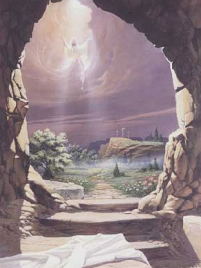Just How Long Did Jesus Stay In The Tomb?
By Daniel Burke | Apr 15, 2011

(RNS) As Christians worldwide prepare to celebrate Easter, they will follow a familiar chronology: Jesus was crucified on Good Friday and rose from the dead on “the third day,” in the words of the ancient Nicene Creed.
But if Jesus died at 3 p.m. Friday and vacated his tomb by dawn Sunday morning — about 40 hours later — how does that make three days? And do Hebrew Scriptures prophesy that timetable?
Even Pope Benedict XVI wrestles with the latter question in his new book, Jesus: Holy Week, about Christ’s last days. “There is no direct scriptural testimony pointing to the ‘third day,”‘ the pope concludes.
The chronology conundrum is “a bit of a puzzle,” said Marcus Borg, a progressive biblical scholar and co-author of The Last Week, a book about Holy Week.
But Borg and other experts say the puzzle can be solved if you know how first-century Jews counted time, and grant the four evangelists a little poetic license.
Jews of Jesus’ time followed a lunar calendar, meaning that days began at sunset. For them, Saturday night was actually Sunday, a schedule that still guides Jewish holy days, such as Shabbat.
Ancient Jews also used what scholars call “inclusive reckoning,” meaning any part of a day is counted as a whole day, said Clinton Wahlen of the Seventh-day Adventist Biblical Research Institute in Silver Spring, Md.
Using these counting methods, a backward calculation from Sunday morning to Friday afternoon makes three days.
Besides, the four evangelists were likely not counting time literally, according to some scholars.
“Expressions like ‘three days’ and ’40 days’ are imprecise in the Bible,” Borg said. For the evangelists, “three days” means “a short period of time.”
Ben Witherington, an evangelical scholar of New Testament at Asbury Theological Seminary in Wilmore, Ky., agreed.
The phrase “three days,” is a colloquialism comparable to “directly” in Southern-speak, meaning “after a little while,” he said. It’s anachronistic to expect the evangelists to monitor time like modern-day men, Witherington said.
“The Gospel writers didn’t walk around with sundials on their wrists the way modern scholars walk around with wristwatches,” he said. “They were not dealing with the precision that we do.”
But precision, especially when it comes to the Bible, has been a hallmark of faith for many Christians — especially those who equate truth with historical facts.
Most troubling for these believers is Jesus’ own prophecy, recorded in the Gospel of Matthew, that he will rise from the dead after “three days and three nights in the heart of the earth.”
Trying to reconcile that prophecy with the Holy Week calendar, ancient Christian theologians such as Gregory of Nyssa and Cyril of Jerusalem counted the eclipse of the sun after Jesus’ death as a night, said the Very Rev. John Behr, dean of St. Vladimir’s Orthodox Theological Seminary in Yonkers, N.Y.
Didascalia Apostolorum, a third-century Christian treatise, took a more radical approach.
It proposes that Jesus and his apostles followed a different calendar than other Jews and celebrated the Last Supper on a Tuesday, meaning the crucifixion happened on a Wednesday. Some fringe Christian denominations still promote that theory.
Others dismiss historical revisions and say Jesus simply misspoke.
“To be technical, Jesus made a false prophecy, and that’s not something most Christians would want to put that way,” said Robert Miller, a professor of religion at Juniata College in Huntingdon, Pa.
But the point of Jesus’ prophecy is to draw a comparison to Jonah, who was willing to die to save his shipmates (and spent three days in the belly of a big fish), not to set a timetable for the Resurrection, said Witherington.
Martin Connell, a scholar at St. John’s University in Collegeville, Minn., calls the chronology conundrum a “never-ending question.”
“So unsettled is the evidence, and so elastic, that the debate will likely always continue,” Connell said.
The Apostle Paul wrote that the third-day Resurrection accords with the Hebrew Scriptures.
Some scholars, such as Wahlen, think Paul is pointing to a passage in the Book of Hosea, which says God will “heal” and “restore” Israel after three days.
Benedict says that theory “cannot be sustained.”
There may be a very practical reason for the Resurrection to have happened in three days after Jesus’ death, scholars say.
First-century tradition held that only after three days could you be sure someone was dead; after four days the spirit was presumed to leave the body.















